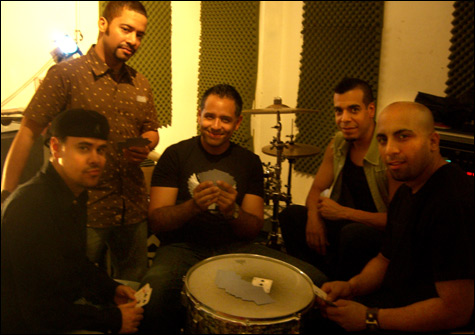
¿QUIÉN ERES? The classic-rock vets in Soulsa turned to Afro-Cuban rhythms only after life had softened their ears to it. |
The Spanish phrase "De donde eres" can be translated two ways. As a question it means, "Where are you from?" As a phrase, it means simply, "from where you are." Cordero leave the question mark off their fourth album, De Donde Eres (Bloodshot), but the English translation at corderomusic.com uses the interrogatory form. It's a trifle, maybe, but Cordero singer-songwriter Ani Cordero admits, "I left out the punctuation on purpose."
This Friday, Cordero headline Casa de La Cultura/Center for Latino Arts' "Rock en Español Festival 2," a four-act bill at the South End's striking Jorge Hernández Cultural Center, which is housed in a century-old church. As it happens, Ani Cordero was born in Boston, the eldest daughter of a Puerto Rican pediatrician who was finishing up his residency at the old Boston City Hospital, just down the road from the Jorge Hernández, and embarking on a master's in public health at Harvard. Her mom was an expert in autism who would later team up with her husband during his long tenure at the Center for Disease Control in Atlanta, where Ani grew up. A few years ago, her parents returned to Puerto Rico so her dad could become a dean at the University of Puerto Rico Medical School, where her parents first met and played music together, even recording an album of traditional tuna ballads. De Donde Eres is Cordero's first album sung entirely in Spanish, and it's also the group's warmest and most inviting disc, no matter what language you speak — perhaps in part because Ani composed it on her mother's old tuna guitar.
If all this somehow makes sense of the indeterminate album title, then consider that the revolving question/statement is also fitting for the festival. Rock en español is renowned mostly for Latin imports (and perhaps a few homegrown Chicano groups, like Ozomatli). The four acts on this bill, however, raise new questions of identity even as they provide answers. Together, they represent a new wave of rock en español centered in the East Coast's immigrant capital, New York City. Ani Cordero formed Cordero there with her husband, drummer Chris Verene, after an aborted Arizona stint with indie-rock vet Howe Gelb, of Giant Sand fame. Venezuelan jazz-folk-experimentalist Juancho Herrera has made Brooklyn his home, 25 years after coming to the states to study at Berklee. Fellow Venezuelan pop-electronica experimenter Rafael Gómez followed a similar route (Toronto-Boston-NYC), though his draw was initially an affair of the heart. And Soulsa are made up of classic-rock vets from the Dominican neighborhood of NYC's Washington Heights who turned to Afro-Cuban rhythms only after life had softened their ears to its appeal.
The divergent sounds these groups make hardly fits the aggressive, all-but-the-kitchen-sink style often associated with rock en español. As Alex Alvear, performance and production manager at the Center for Latino Arts, points out, "It's not that you'll see this and be able to put a label on it that compares it to any other mainstream artist. I mean, it has the edge of rock, but it has a totally different sound as well."